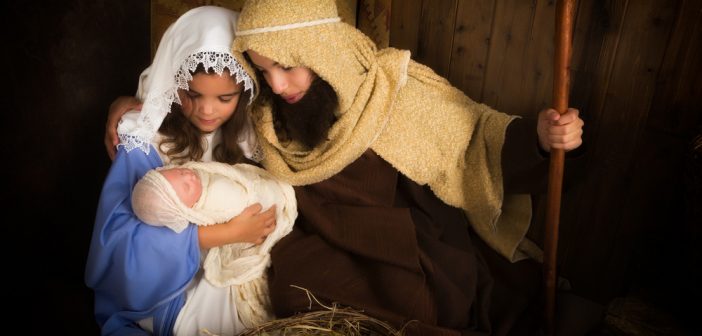Doug Ruffle, who once served as a missionary in Argentina, shares the heartwarming story of a Christmas pageant that went off script, yet captured the true meaning of Christmas. It invites us to make room for the Christ Child in our lives.
As a missionary in Argentina, I served Peace Community Church in Rosaria. It was an intimate community of faith. Their worship center, converted from a neighborhood house, had been built to accommodate up to 60 people. Relationships among members felt like family. The church carried from its earliest days a keen sense of mission.
One Christmas week, on a Saturday evening, Peace Community had gained permission from the local police to close off the street so they could put on a Christmas pageant for the neighborhood. They took chairs from the worship center and placed them in the street, facing the church building. The youth and children of the church — dressed as shepherds or wise men or the innkeeper and, of course, as Mary and Joseph — reenacted the events of Jesus’ birth. The babe was a doll dressed in swaddling clothes. Late December is summer in the southern hemisphere, and the temperatures were warm. It was a very pleasant evening.
Church members placed a loud speaker on the roof, so people could hear recorded music and the dialogue of the children. Filling the seats were neighbors from a three-block radius: Roman Catholics, Protestants, Pentecostals, and those who professed no religion at all. They procured a real donkey to transport “Mary” past the front of the church. The church’s front door served as the inn.
The role of the innkeeper went to Facundo, a 12-year-old boy who had already grown to six feet tall. Facundo was the church caretaker’s son and lived in the rear of the property. While large for his age, he was gentle of spirit. All the children loved him.
With the music playing softly from the roof, Joseph led the donkey that carried Mary and stopped in front of the “inn” and knocked. Facundo opened the door and stood in the doorway. When he saw the donkey, and Mary sitting on it, his eyes grew wide. He had been given two lines, the first of which was: “There is no room in the inn.” Later he was to say, “We have a stable you can use.”
“Joseph” asked for a room, which was the cue for Facundo’s first line. Facundo kept looking at Mary on the donkey and said nothing. One could hear soft, nervous laughter coming from the audience. A prompter from behind the church door softly repeated Facundo’s line. Finally, after what seemed like an eternity, Facundo said his line aloud. Joseph insisted. “But we have come from a long journey, and my wife is due to have a baby.”
Facundo looked at the donkey that carried Mary and looked at Mary. The prompter whispered his line once again from the other side of the door. “There is no room in the inn,” repeated Facundo, this time with hesitancy. He stood in the doorway watching. Joseph insisted again. “We are so tired; do you know anywhere we can stay?”
This was the cue for Facundo’s second line. He looked at the donkey and Mary and Joseph. The prompter softly said his line from the other side of the door. Again, a nervous murmur came over the audience. The prompter repeated the line.
Facundo stood still, looking at the couple. Then he blurted out, “You can have my room!” pointing to the rear of the church property. There was silence. Joseph just looked at Facundo and said nothing. It wasn’t supposed to have played out this way. If Facundo had said his lines correctly, Mary and Joseph and the babe would have gone to the end of the sidewalk in front of the church, where there was a “stable” prepared for them.
Finally, Mary broke the ice. “Okay,” she said. “That’s really nice of you.” She dismounted from the donkey. The caretaker led the donkey away, and Joseph and Mary went through the door of the “inn” to stay in Facundo’s room.
The audience burst into applause. The children took their bows. The pageant couldn’t have been scripted any better. Facundo stole the show and the hearts of the neighborhood. He had captured the meaning of Christmas, because he made room for the Christ Child in his life. It was the most wonderful Christmas pageant ever. Facundo showed us a way to love.
This material is taken from the book A Missionary Mindset: What Church Leaders Need to Know to Reach Their Community — Lessons from E. Stanley Jones, by Douglas Ruffle. Copyright © 2016 Discipleship Resources, Nashville, Tennessee. All rights reserved. Used by permission. The book is available through Cokesbury and Amazon.
Related Resources:
- Opening Doors on Christmas Eve by Brian Bauknight
- Christmas Giving for Christ by Melvin Amerson
- A More Empowering Christmas Gift Give-Away by Faith Fowler







